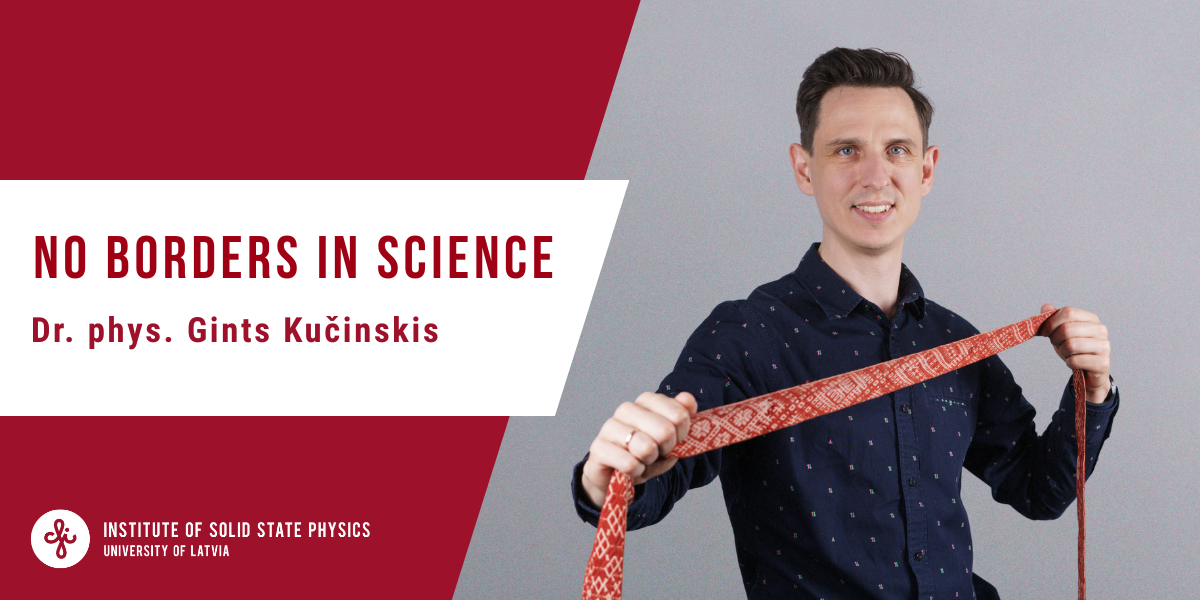
No Borders in Science is a series of interviews with Institute of Solid State Physics (ISSP UL) scientists and employees who are closely connected to the world outside of Latvia – by birth, attained education, or just their daily work. Through their stories we want to highlight the institute as a part of the global scientific network – a centre of excellence where collaboration isn’t limited by geography and the exchange of ideas, experiences, and efforts is placed at the forefront. This time, we speak with Gints Kučinskis about accruing expertise on energy materials from the world’s sharpest minds and being a driving force in the changes you want to see.
In your own words, what is your scientific specialty? Any topics of interest outside of it?
As the world moves towards more sustainable energy generation and storage, I contribute by creating materials and processes for next-generation energy storage. I lead a research lab focused on Li-ion and Na-ion batteries, developing and improving electrode materials, as well as studying the ageing of materials and battery components. Our laboratory also explores complementary energy technologies, such as hydrogen generation. In addition to core scientific tasks, such as planning experiments, supervising researchers, and writing scientific papers, I also generate ideas and develop them into competitive project applications.
How did your journey in science lead outside of Latvia?
My journey in energy storage materials began at ISSP UL where I wrote my bachelor’s thesis, during a time when battery research in Latvia was re-emerging. I continued working here until my PhD studies, when I had the valuable opportunity to deepen my expertise on battery materials at the Max Planck Institute for Solid State Research in Stuttgart, supported by a scholarship from the Deutsche Bundesstiftung Umwelt.
After completing my PhD, it was clear to me that I wanted to continue expanding my knowledge. At that point, continuing my career abroad was not only an exciting opportunity – it was also essential in order to gain broader experience, collaborate internationally, and work with advanced research infrastructure that wasn’t yet readily available in Latvia. Research funding opportunities were also limited at home, particularly for early-career researchers.
I therefore spent another 3 and a half years as a postdoctoral researcher at the Max Planck Institute, where I worked in high-level research environment, developed new skills, and built a professional network that I continue to benefit from today.
And what led you back to the Institute of Solid State Physics?
Returning to Latvia and ISSP UL was certainly not an easy decision at the time. The opportunity to continue working in the field I am passionate about, while being close to friends and family and maintaining academic freedom was a strong motivating factor.
Despite the uncertainties and limited resources back then, over time, thanks to many extra hours of work and, undoubtedly, support from colleagues and family, I was able to secure additional funding, significantly expand the team, and now lead a laboratory of over 25 people focused on the development of battery materials and hydrogen energy technologies.
Admittedly, between when I left for Germany in 2015 and now, the research environment in Latvia and at ISSP UL has improved significantly. We now work with modern equipment, have good institutional support, and an increasingly international outlook. Our lab hosts and trains not only Latvian students and researchers but also talents from abroad and has many successful international collaborations with Latvian and European research institutes and companies. So much so, that my past-self would certainly be very envious of the opportunities that students and young professionals today have at ISSP UL.
If there is one thing this experience has taught me, it's to never underestimate your ability to shape your environment and drive meaningful change.
How does the ISSP UL assist scientists (proliferating participation in projects and events, supporting funding acquisition, endorsing growth opportunities, etc.)?
ISSP UL provides a supportive environment for researchers by ensuring strong administrative assistance and allowing scientists to focus on the substance of their work as much as possible within our project-driven system. The institute encourages participation in international projects and events, actively supports funding acquisition, and promotes professional growth. Importantly, there is a culture of practicality here which I facilitate as much as I can – decisions and support are guided by what makes sense and what helps drive progress.
Currently, what is your next goal – in science, career-wise, or just in general?
My current goal is to continue building a strong, motivated research team and to further strengthen the ecosystem working on energy storage – both within ISSP UL and beyond. I hope to see some of our innovations successfully transition from the lab into real-world industrial applications, where they can make a tangible impact.